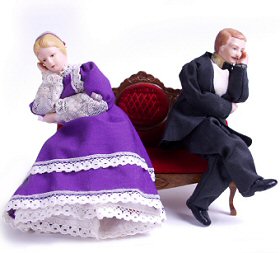 A few months ago I spent a couple of weeks with my aging parents, helping to fix up their small farm. One evening the prospects for television looked dim and I suggested renting something. My mother had only one directive; "Nothing violent!" So I did a quick mental scan and suggested the series Six Feet Under. I�d seen some episodes before and found it marvelously entertaining. So we rented the first disc of season one and I stretched out on the couch expecting a full night�s entertainment. Unfortunately, we didn�t make it through the first episode. There was a sex scene (I�d forgotten) and much, much worse - there was swearing! My mother didn�t seem so upset but my father was seething about it. I was genuinely surprised. "But Dad," I said, "You worked in the mill. Those guys couldn�t get out a sentence without saying "fuck" at least three times." He looked at me as if I had lost my mind. "Not in front of your mother they didn�t!"
A few months ago I spent a couple of weeks with my aging parents, helping to fix up their small farm. One evening the prospects for television looked dim and I suggested renting something. My mother had only one directive; "Nothing violent!" So I did a quick mental scan and suggested the series Six Feet Under. I�d seen some episodes before and found it marvelously entertaining. So we rented the first disc of season one and I stretched out on the couch expecting a full night�s entertainment. Unfortunately, we didn�t make it through the first episode. There was a sex scene (I�d forgotten) and much, much worse - there was swearing! My mother didn�t seem so upset but my father was seething about it. I was genuinely surprised. "But Dad," I said, "You worked in the mill. Those guys couldn�t get out a sentence without saying "fuck" at least three times." He looked at me as if I had lost my mind. "Not in front of your mother they didn�t!"
And there it was, yawning before us, the only true generation gap the world has seen. A schism that will be seen by future historians as deep and profound as the reformation itself. My Dad was raised in a world before the sexual/social revolution of the later twentieth century. He is a lingering vestige of a moral climate that had held for centuries and covered much of the northern hemisphere.
We call it the Victorian Age but the years encompassing the reign of Queen Victoria were merely the apex (or nadir, if you prefer) of a way of thinking that wedded Protestant morality to notions of chivalry that had their roots deep in the medieval era. It was an age of extreme dichotomy. At no point in history was the Madonna-whore complex more pronounced that during the 19th century. Women, (at least those that weren�t fallen), both in literature and life were idolized for their purity. They were seen as virginal and vulnerable. It was the duty of men to protect women. Not from danger, of course. The world of the Victorian middle class lady was hardly perilous. Rather, they had to be protected from anything that could trouble their delicate sensibilities. Things like�coarse language, harsh business, social realities and, of course... sex.
Women weren�t supposed to enjoy sex in the Victorian Age. This was a logical consequence of the intersection of Protestant/Puritan thought with chivalrous principles. According to the Puritans, pleasure of almost any kind was sinful and few things were as pleasurable and sinful as sex. So if women were to be considered pure - "angels in the house," as they were known (after a poem of that name) - then they were above such earthy impulses as carnal lust.
Men, it�was understood, were not above such impulses. Men were considered morally degraded. Lust was in their nature. They couldn�t escape it. But it was thought, at least with their wives, that sex should be kept to a minimum. Men were exhorted to not impose themselves sexually on their dear wives more than once a month. Once a week at most!
For the most part, women went along with this. Perhaps with good reason. If pleasurable sex was sinful, then for virtuous women that only left unpleasurable sex. It�s not hard to imagine that a shag with a typically proper Victorian gent was often, to paraphrase Thomas Hobbs, "nasty brutish and short." Small wonder women were told to; "Lie back and think of England."
 But if men weren�t supposed to trouble their wives anymore than necessary, what were they to do with all their pent-up lust? Masturbation was out of the question. Masturbation was considered both a degrading perversion and a serious health risk. The solution then was prostitution. At no time in history has prostitution been as prolific as at the height of the Victorian era. London, a city of 2 million in the mid-19th century had about 50,000 working prostitutes. That�s about one prostitute for every 12 adult males. New York at this time had a similar ratio, leading Robert Dale Owen, a social reformer, to estimate the half the male population visited prostitutes three times a week.
But if men weren�t supposed to trouble their wives anymore than necessary, what were they to do with all their pent-up lust? Masturbation was out of the question. Masturbation was considered both a degrading perversion and a serious health risk. The solution then was prostitution. At no time in history has prostitution been as prolific as at the height of the Victorian era. London, a city of 2 million in the mid-19th century had about 50,000 working prostitutes. That�s about one prostitute for every 12 adult males. New York at this time had a similar ratio, leading Robert Dale Owen, a social reformer, to estimate the half the male population visited prostitutes three times a week.
This estimate is likely an exaggeration because not all these women were professional. Most in fact were Dollymops, down and out country girls who came to the city, worked in garment factories at starvation wages and engaged in amateur prostitution to make ends meet. Many of these girls, however, did eventually become full time prostitutes. There wasn�t a lot of upward mobility for working class women in the Victorian age.
In the mid-19th century, prostitution was not the underworld scourge it was later to become. Brothels, often located in the fashionable districts, catered discreetly to the moneyed class while street-walkers openly catered to the poor. By and large it was tolerated, in part because it was seen as a necessary sexual outlet and in part because the men who were in a position to outlaw prostitution were also its procurers.
There wasn�t the same shame in visiting prostitutes that there is now.� Everybody did it - from princes to paupers. In fact, there is a conspiracy theory that Jack the Ripper was actually a doctor working on behalf of the Prince Albert Victor, the crown prince who, as the theory goes, impregnated one of the Ripper�s victim�s (all prostitutes). Victorian England may have been tolerant of prostitution but it would have seriously balked at a bastard future king. Prince Albert died just a few years later of what some believe was syphilis.
Which brings us to the natural corollary of all this Victorian whoring. Venereal diseases, especially gonorrhea and syphilis, were rampant in the 19th century. In London in 1856, there were 30,000 recorded cases, and those were just those that were recognized. It�s likely that many more cases were not recognized or went untreated.
Such was the extent of syphilitic infection that there arose a demand in London for "virgin" prostitutes. It was assumed, logically enough, that a virgin would not�have been exposed to sexually transmitted diseases. There was also a theory that a syphilitic infection could be cured by sleeping with a virgin. As such, there developed a trade in prostitutes as young as 13. Some brothels even hired doctors to authenticate certificates of virginity. Of course, because you can only lose your virginity once, virgins didn�t come cheap. The price discrepancy naturally led to the development of re-virginating techniques. Experienced prostitutes passing themselves off as virgins would place fish bladders filled with blood in their vaginas prior to insertion to replicate the blood loss associated with the breach of the maidenhead. Powerful astringents were also used to constrict the vaginal opening.
If all this seems beyond the pale to our modern sensibilities, imagine how it would have appeared to the stern moralists of the Victorian era.� These moralists,�an�mixture of�later-day puritans and social progressives, campaigned to ban prostitution and a number of other perceived vices. In fact, much of the prudishness we associate with the Victorian Age can be attributed to the efforts of these reformers. And while we can look back on that time with a certain smugness at their righteous zeal, there is no denying that there was something seriously wrong with the state of sex in the Victorian age.
While these moralists never succeeded in outlawing prostitution, they did manage to ban brothels and criminalize its procurement. This drove prostitution underground and into the grip of the criminal class where it largely remains. This, combined with rising wages and opportunities newly available to working women, meant that the services of prostitutes would never again be so easily and cheaply available.
Therefore, if ever there was a sexual ice age it wasn�t during the reign of Queen Victoria but in the years and decades after her death. The years when my father and grandfather and millions of other horny young men spent their early lives wooing, begging and gnashing their teeth. Every guy my age has wondered in secret how guys back then managed to get laid and the sad truth is that a lot of them didn�t. Prospective wives were still virginal, vulnerable, to be protected from cussing and overtly sexual advances.
People did have sex of course. But it was fraught with discomfort and danger. Discovery could ruin a woman�s reputation and her chances of a good marriage. Pregnancy outside marriage in the early years of the twentieth century was simply unthinkable.
Then along came the contraceptive pill and everything changed.
Next week � the sexual revolution.
Related:
Getting Laid In The Middle Ages
Christianity And Sex
Selective Memory Spoils Adolescent Virginity Pledges
No-Sex Pledges Linked To High-Risk Sexual Behavior
The Virginity Trap

